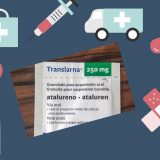Pesquisa não comprova efeito da pentoxifilina no tratamento da distrofia muscular de Duchenne
USA – nesta pesquisa realizada em vários centros no mundo, os autores estudaram a pentoxifilina, uma droga que demonstrou efeitos em camundongos. A droga foi usada por 12 meses em meninos com distrofia muscular de Duchenne tratados com corticóides. Os resultados observados não demonstraram efeito da droga sobre a força muscular e na função pulmonar.
O resumo em inglês pode ser lido abaixo:
(Neurology, 2012) Pentoxifylline as a rescue treatment for DMD. A randomized double-blind clinical trial
D.M. Escolar, A. Zimmerman, T. Bertorini, P.R. Clemens, A.M. Connolly, L. Mesa, K. Gorni, A. Kornberg, H. Kolski, N. Kuntz, Y. Nevo, C. Tesi-Rocha, K. Nagaraju, S. Rayavarapu, L.P. Hache, J.E. Mayhew, J. Florence, F. Hu, A. Arrieta, E. Henricson, R.T. Leshner, and J.K. Mah
Abstract
Objective: To determine whether pentoxifylline (PTX) slows the decline of muscle strength and function in ambulatory boys with Duchenne muscular dystrophy (DMD).
Methods: This was a multicenter, randomized, double-blinded, controlled trial comparing 12 months of daily treatment with PTX or placebo in corticosteroid-treated boys with DMD using a slow-release PTX formulation (∼20 mg/kg/day). The primary outcome was the change in mean total quantitative muscle testing (QMT) score. Secondary outcomes included changes in QMT subscales, manual muscle strength, pulmonary function, and timed function tests. Outcomes were compared using Student t tests and a linear mixed-effects model. Adverse events (AEs) were compared using the Fisher exact test
Results: A total of 64 boys with DMD with a mean age of 9.9 ± 2.9 years were randomly assigned to PTX or placebo in 11 participating Cooperative International Neuromuscular Research Group centers. There was no significant difference between PTX and the placebo group in total QMT scores (p = 0.14) or in most of the secondary outcomes after a 12-month treatment. The use of PTX was associated with mild to moderate gastrointestinal or hematologic AEs
Conclusion: The addition of PTX to corticosteroid-treated boys with DMD at a moderate to late ambulatory stage of disease did not improve or halt the deterioration of muscle strength and function over a 12-month study period.
Classification of evidence: This study provides Class I evidence that treatment with PTX does not prevent deterioration in muscle function or strength in corticosteroid-treated boys with DMD



